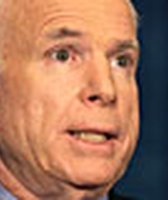Stand up for the facts!
Our only agenda is to publish the truth so you can be an informed participant in democracy.
We need your help.
I would like to contribute
SUMMARY: The SCHIP debate has candidates from both parties trying to turn a complicated program into partisan talking points and the truth is sometimes lost along the way.
The State Children's Health Insurance Program is complicated. The federal government gives money to the states, which are responsible for setting up individual programs to provide needy children with health care. So, like Medicaid, the SCHIP program is actually 50 different programs across the country.
But when the 2008 presidential candidates get hold of it, the program becomes quite simple.
To Republican Rep. Duncan Hunter of California, it's just the latest step toward socialism. To Democratic Sen. Hillary Clinton of New York, it's a vital method to make sure kids can see a doctor. To Republican Rep. Ron Paul of Texas, the program somehow is linked to the increased use of psychotic drugs in children.
SCHIP became a hot issue when President Bush earlier this month vetoed a bipartisan compromise bill to expand the program by $35 billion between 2008 and 2012. At the moment, the SCHIP program will provide $5 billion a year over the next five years. Bush said the expanded program would cost too much, and it would cover people who make too much money. Senators are confident they would have the votes to override the veto. The House vote, scheduled for Thursday, is likely to be close, but supporters are expected to fall short of the number needed to turn the bill into a law over Bush's objections.
Technically, funding for the program expired on Sept. 30, 2007, but the program is being funded by a short-term spending bill set to run out on Nov. 16, 2007. Negotiators may then return to the table and try to hammer out some sort of compromise that Bush will accept. They also could pass a short-term extension, buying themselves more time.
"The Republicans are better off if it's resolved quickly," said Republican strategist John Feehery, former communications director for former House Speaker J. Dennis Hastert, R-Ill. "The Democrats have a much simpler message: 'We're for children and they're not.'"
Many Democrats are delivering that message. For instance, Democratic candidate Sen. Joseph Biden of Delaware said: "With one stroke of the pen, President Bush has denied health insurance to 3.8 million kids who were due to get it under this bipartisan expansion."
That is the figure being used by members of Congress who wrote the bill, as well as the Congressional Budget Office, which analyzed it.
Other Democratic presidential candidates argue that Bush's veto over the cost demonstrates misplaced priorities. Sen. Christopher Dodd, D-Conn., said the cost of about three months of the war in Iraq equals five years of an expanded SCHIP program. Three months of war costs equal $30 billion, while the SCHIP bill would cost about $35 billion, so Dodd is off by a bit.
Nonetheless, Democrats insist they have a more compelling argument to make. "In terms of the domestic agenda, it's the first issue that's broken through the war in Iraq," said Steve Elmendorf, former chief of staff for former House Democratic Leader Richard Gephardt.
For Democrats, he said, "It's a total win."
A leading political scientist agreed. "I think it helps the Democrats," said James Thurber, director of the Center for Congressional and Presidential Studies at American University in Washington, DC. Thurber said health care is the second-most important issue among voters.
Republicans, on the other hand, are attempting to appeal to their conservative base, which is concerned about the federal deficit and an expanded federal government. Hunter calls the SCHIP program socialism. Sen. John McCain, R-Ariz., says that President Bush was correct to veto the expansion because under the expansion, everybody would be eligible for the program.
"They're appealing to the conservative base of the Republican Party that's concerned about government spending," Thurber said.
It remains to be seen how far either side can take the SCHIP issue. If the House does not override the veto and negotiators hammer out some sort of compromise that Bush signs, the issue could be dead by the 2008 general election.
But "If the Democrats refuse to negotiate, it could come back to haunt them," said Republican Feehery.
If no deal is cut, Congress could simply pass a short-term extension of the program. Under those circumstances, "The Democrats will attempt to get the Republicans to state their positions," said Stephen Wayne, a government professor at Georgetown University and the author of 'The Road to the White House.'
Wayne added that the Republican small-government position may not sell well during a general election campaign in which candidates must appeal to moderate voters.
"It's one thing to take this position during the nominating process," he said. "It's another to run in a Democratic year as a mean-spirited Republican."
Our Sources
CQ interview with Stephen Wayne, Georgetown University, Oct. 15, 2007. CQ Interview with James Thurber, American University, Oct. 15, 2007. CQ interview with Steve Elmendorf, Oct. 15, 2007. CQ interview with John Feehery, Oct. 15, 2007. Congressional Research Service The Cost of Iraq, Afghanistan and Other Global War on Terror Operations July 16, 2007
Sen. Chris Dodd website Statement on President Bush's SCHIP veto
President Bush Remarks on SCHIP veto October 3, 2007
House Energy and Commerce Committee The SCHIP expansion legislation





































